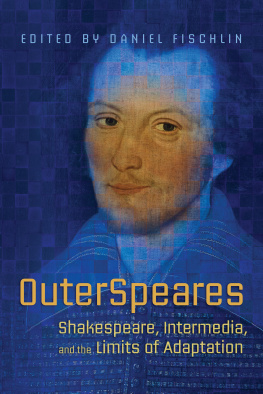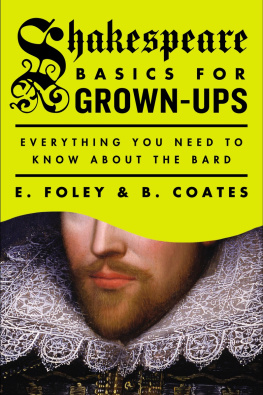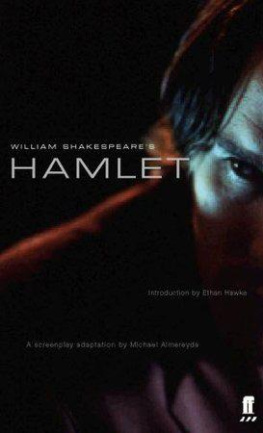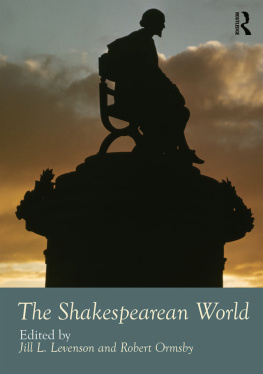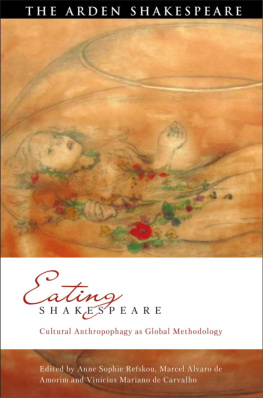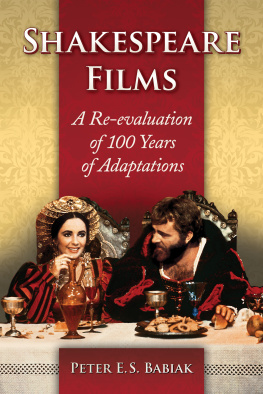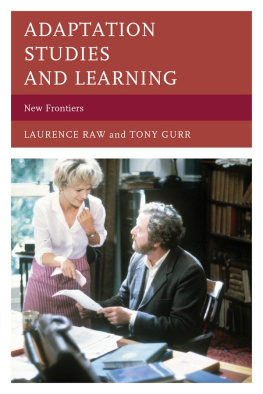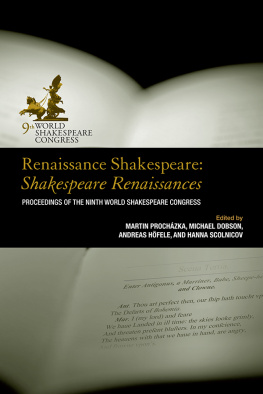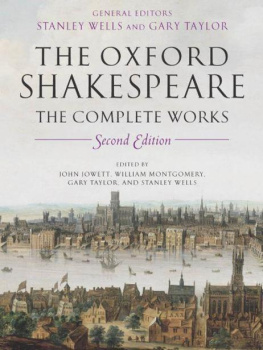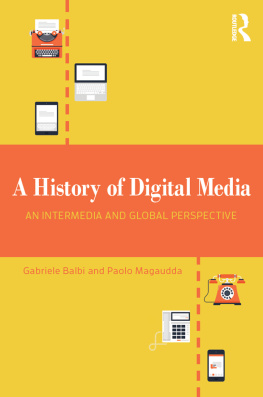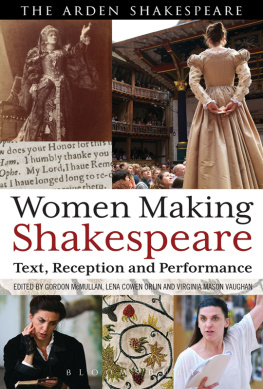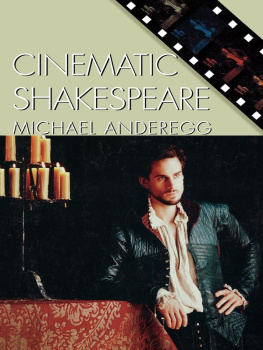Contents
DANIEL FISCHLIN
Part One: Strange Invention: Shakespeare in the New Media
CHRISTY DESMET
JENNIFER L. AILLES
Part Two: These Violent Delights Have Violent Ends: Shakespearean Adaptation and Film Intermedia
DON MOORE
DANIEL FISCHLIN, TOM MAGILL, AND JESSICA RILEY
Part Three: All the Uses of This World: TV, Radio, Popular Music, Theatre, and the Uses of Intermedia
KIM FEDDERSON AND J. MICHAEL RICHARDSON
ANDREW BRETZ
DANIEL FISCHLIN
JAMES MCKINNON
Part Four: Give No Limits to My Tongue I Am Privileged to Speak: The Limits of Adaptation?
MONIKA SMIALKOWSKA
SUJATA IYENGAR
MARK FORTIER
Acknowledgments
This book results from many circumstances, not the least of which are years spent developing multimedia and intermedial ways of teaching Shakespeare via some of the technologies deployed on the Canadian Adaptations of Shakespeare (CASP) website. Ongoing work on that site has afforded me a unique opportunity to explore various forms of online intermediality, from multimedia galleries and literacy games through to mobile technologies associated with apps. Along this journey I have encountered many talented individuals in a variety of disciplines, without whom this book would never have happened. These include Mat Buntin, John Campbell, Kenny Doren, Brad Eccles, Darina Griffin, Arni Mikelsons, Max Summerlee, and a host of other media and IT creative thinkers who have broadened my own view of what is possible when thinking through the relationship between new media and older forms of literacy associated with Shakespeare.
The specific impetus for the book arose out of an international graduate student conference organized and held at the University of Guelph in November 2011. The conference sought to frame problems of intermediality and Shakespeare in ways that were true to the emerging realities so many of us were experiencing with Shakespeare as a thoroughly mediated site of cultural production. Many people contributed to the success of that conference including Andrew Bretz, Mark Kaethler, Mauricio Martinez, and Jessica Riley, four doctoral students who played key roles in realizing the conferences aims. The University of Guelph, particularly the Office of the President, the Office of the Vice-President of Research, and the Office of the Dean and Associate Dean (Research) of the College of Arts, contributed a significant amount of resources to the event. I thank President Alastair Summerlee, Dr Kevin Hall, and Drs Don Bruce and Stuart McCook for their generosity and their vision in foregrounding and supporting this transdisciplinary research in the arts and humanities. A protracted period of discussion and debate followed the conference, drawing a wider community of participants into the discussion. That discussion and the ongoing work elaborating the ideas that came out of the conference have resulted in this book, the first to examine Shakespearean cultural production specifically through the theoretical lens of intermediality.
Im especially grateful to all the contributors to OuterSpeares: the book went through a significant set of exchanges and edits that reflect their talents and exceptional engagement. Early work on the book was enabled by a Social Sciences and Humanities Research Council of Canada Standard Research grant and publication of the book itself was supported by the office of the Vice-President of Research at the University of Guelph and by the Presidents Office also at the University of Guelph. The University Research Chair (URC) program at the University of Guelph also helped fund this research. The four external referees for the book provided significant, constructive input on how to refine the manuscript, and their time and effort are deeply appreciated. To my editor at University of Toronto Press, Suzanne Rancourt, a profound thank you for her professionalism, enthusiasm, and commitment through the publication process, as to Judy Williams, who copyedited the manuscript with skill and insight. To Jennie Hissa and Rachel Shoup, my superb research assistants throughout this venture, deep gratitude for your efforts and professionalism. To Martha, Damian, Hannah, Zo, and Esm, as always, heartfelt thanks for the creative and loving family space that has supported this work.
This volume is dedicated to the memory of Kenny Doren, a longtime collaborator on the CASP site and friend who died tragically in 2012. Kenny was a multimedia artist whose work was instrumental in shaping and influencing many of the ideas found in this volume. He was a brilliant presence in so many ways as an artist and creative thinker, as a technical, multimedia wizard, and as a theorist and scholar. His light will be sorely missed, and this book is a small token honouring his memory.
OuterSpeares:
Shakespeare, Intermedia, and the Limits of Adaptation
EDITED BY DANIEL FISCHLIN
University of Toronto Press
Toronto Buffalo London
In memoriam
Kenny Doren
But if the while I think on thee, dear friend,
All losses are restored and sorrows end.
(Shakespeare, Sonnet 30)
University of Toronto Press 2014
Toronto Buffalo London
www.utppublishing.com
Printed in the U.S.A.
ISBN 978-1-4426-4785-5 (cloth)
ISBN 978-1-4426-1593-9 (paper)

Printed on acid-free, 100% post-consumer recycled paper with vegetable-based inks.
Library and Archives Canada Cataloguing in Publication
OuterSpeares: Shakespeare, intermedia, and the limits of adaptation/edited by Daniel Fischlin.
Includes bibliographical references and index.
ISBN 978-1-4426-4785-5 (bound). ISBN 978-1-4426-1593-9 (pbk.)
1. Shakespeare, William, 15641616 Adaptations. 2. Shakespeare, William, 15641616 Dramatic production. I. Fischlin, Daniel, 1957, editor
PR3100.O98 2014 822.3'.3 C2014-904024-5
University of Toronto Press acknowledges the financial assistance to its publishing program of the Canada Council for the Arts and the Ontario Arts Council, an agency of the Government of Ontario.

University of Toronto Press acknowledges the financial support of the Government of Canada through the Canada Book Fund for its publishing activities.
OuterSpeares: Shakespeare, Intermedia, and the Limits of Adaptation
Edited by Daniel Fischlin
For Shakespeare and Shakespearean adaptation, the global digital media environment is a brave new world of opportunity and revolution. In OuterSpeares: Shakespeare, Intermedia, and the Limits of Adaptation, noted scholars of Shakespeare and new media consider the ways in which various media affect how we understand Shakespeare and his works.
Daniel Fischlin and his collaborators explore a wide selection of adaptations that occupy the space between and across traditional genres what artist Dick Higgins calls intermedia ranging from adaptations that use social networking, Cloud computing, and mobile devices to the many handicrafts branded and sold in connection with the Bard.
With essays on YouTube and iTunes as well as radio, television, and film, OuterSpeares is the first book to examine the full spectrum of past and present adaptations, and one that offers a unique perspective on the transcultural and transdisciplinary aspects of Shakespeare in the contemporary world.

